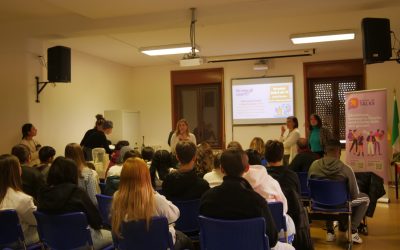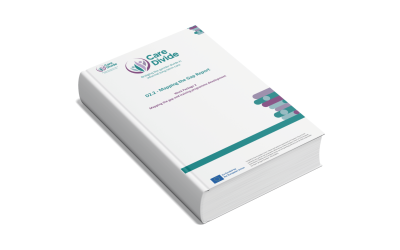
Why should we educate on gender equality, sexuality, and affectivity?
We firmly believe that education for gender equality and equity, understood as the concepts highlighting that women and men, girls and boys and all other genders with different needs and power should have equal conditions, treatment and opportunities for realizing their full potential, human rights and dignity and that differences should be identified and addressed in a manner that rectifies the imbalances.
The stereotyped norms and behaviours that are the cause of any kind of gender-based violence are always influenced by rigid social structures that have always been imposed in society and that determine the emotional and sexual sphere, both in young and adult people.
For this reason, we believe that more and more spaces should be created to reflect on issues such as affectivity and sexuality, gender roles and stereotypes, and the different types of violence that result from them.
At school, for example: this is where people begin to form their identity and personality, and where they become tolerant, responsible, self-confident people, without limits or constraints. It is necessary to start at school to reverse the course and deconstruct these stereotypes, roles, and gender norms, which even during adolescence 'must' be adopted to be accepted in the society in which they live.
But also in other contexts by:
- strengthening the competencies of support services, we improve the lives of people who have suffered different types of violence;
- networking at local, national, and international level, we ensure that knowledge and good practices on prevention, awareness-raising and support are shared and replicated;
- developing policy recommendations, we support gender equality in different areas and promote changes at political level.
We believe that it is only through knowledge, dialogue, and experimentation that we can raise awareness on these issues and create real change in society, aimed at combating inequalities, discrimination, and gender-based violence.
What do we do?
Through prevention, information, awareness-raising, and support, CESIE works closely with the school world and with professionals to address these issues and support change.


By actively involving schools
We visit classrooms to analyse gender stereotypes, roles and norms, in order to overcome them; to talk about sexuality and affectivity with young people to guide them towards the creation of healthy relationships that aim at the well-being of all; to teach them to recognise gender-based violence and to fight it;

By raising awareness and training adults
We provide tools and methodologies to school staff, families, educators, service providers, professionals of all kinds and policy makers, so that they themselves can convey inclusive, positive messages towards sexuality and affectivity, and be able to identify and respond adequately to episodes of gender-based violence in any context.
Events
News & information
Building safe communities: the Counseling Desk launched at ‘Ferrara’ high school
Preventing gender-based violence and promoting mental wellbeing in schools requires acting where personal and relational growth takes shape. It is precisely among students, together with qualified professionals, that real and lasting change can begin: a daily practice...
25 November: DialoghiAMO for a society free from gender-based violence
Still in 2025, violence against women and gender-diverse individuals remains systemic and pervasive. On 25 November, for the International Day for the Elimination of Gender-Based Violence, we remember that this is a structural issue that increasingly manifests online,...
Guaranteeing children’s rights, starting from young voices
Every year on 20 November, we mark World Children’s Day to reaffirm a fundamental message: the rights of children and adolescents are human rights – universal and non-negotiable. Guaranteeing and protecting these rights is essential, and so is listening to young...
Interactive resources and content
EQUAL-CARE – Insight report on gender stereotypes in care
This report presents a cross-country analysis of how gender stereotypes influence caregiving systems across partner countries.
MEDUSA – Policy recommendations
This document presents a set of policy recommendations aimed at improving national responses to online violence, and especially OGBV, in Slovenia, Italy, and Croatia.
CARE-DIVIDE – Mapping the Gap report
The Mapping the Gap Report examines the gender gap in long-term care. It analyses legal frameworks, policies, stereotypes, and barriers.
Do you want to be part of this process?
Consult the available resources, find out about current initiatives, or write to us for more information:












